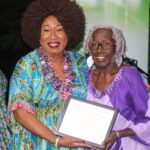Madam Yoko, born Soma in the Gbo Chiefdom, was the head of the Mende people of Sierra Leone. She ruled the extensive Kpa Mende Confederacy for decades before her death.
Also known as Mammy Yoko, she and three brothers were raised by their warrior father in the outlands of the West African country.
Madam Yoko’s rise to power is attributed to cunning, beauty, fortuitous marriages, and membership in Sande, a women’s initiation society. The society initiates girls into adulthood and includes ritual dancing and female genital mutilation. The title of madam is bestowed upon graduation.
Historically, women who complete the Sande rite of passage gain social and political power. Madam Yoko was considered a renowned member who deployed her Sande instruction to the greatest advantage, especially when it came to charming and manipulating the British as they sought to control the region in the early 19th century.
The road to power did not begin with marriage to her first warrior husband, Gongoima, who she left in the 1880s, but with Gbenje, the chief of Taiamav. It was a childless union, but despite the value placed on fertility, she was elevated to senior or great wife, highly favoured for her intellect. After Gbenje’s death, she married his friend, Gbanya Lango, the powerful war chief of Senahun People who lived south-west of Tiama.
Gbanya clashed with the British as they were establishing their protectorate in Freetown in 1875 and was arrested. It is said that Madam Yoko used beauty and wit to win her husband’s freedom. Recognising her diplomatic skill, Chief Gbanya elevated Yoko to head wife and began to send her to negotiate with British officials. During their marriage and after Gbanya’s death in 1895, Madam Yoko proved herself to be an able interlocutor in the last decades of the 19th Century.
However, her rule, which eventually included 15 individual chiefdoms, was a controversial one. She collaborated with the British, directly and indirectly, helping to foment the Bai Bureh War (Hut Tax Rebellion of 1898), which both facilitated the British Protectorate of Sierra Leone declared in 1898 and solidified her control over the indigenous chiefdoms.
Known as the Queen of Senehun after her husband’s successor’s death in 1878, formally recognised as Supreme Chieftain by the British in 1894 and a recipient of Queen Victoria’s silver medal of loyalty, Madam Yoko amassed vast wealth. Yet during her reign, she was forced to take refuge in a British-run police station, hiding from the violence she helped instigate.
The exact date of her birth is unknown, but it is believed she committed suicide by drinking poison at the height of her authority in Moyamba in 1906. At the time of her death, the Kpa Mendi Chiefdom extended from Bauya in the West to Tabe in the East and from the Timne chiefdoms in the North to the Banta and Shebro chiefdoms in the South.
Madam Yoko is considered an example of successful, modern-day leadership by an African woman.
(Source: blackpast.org)
The post #BTAfricanAwarenessMonth – Mammy Yoko: Leader of the Mende people appeared first on Barbados Today.


